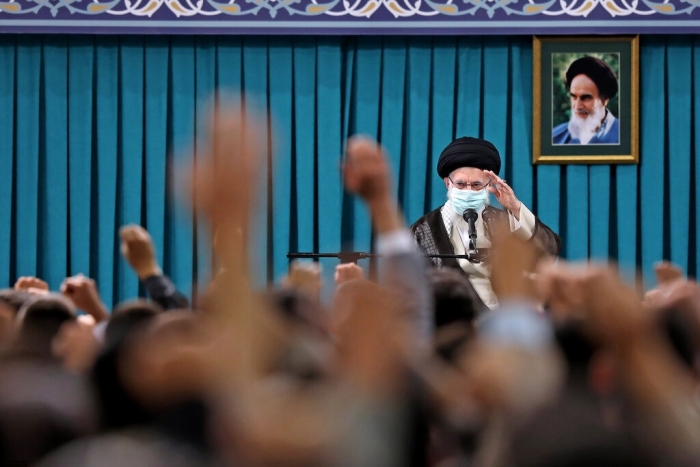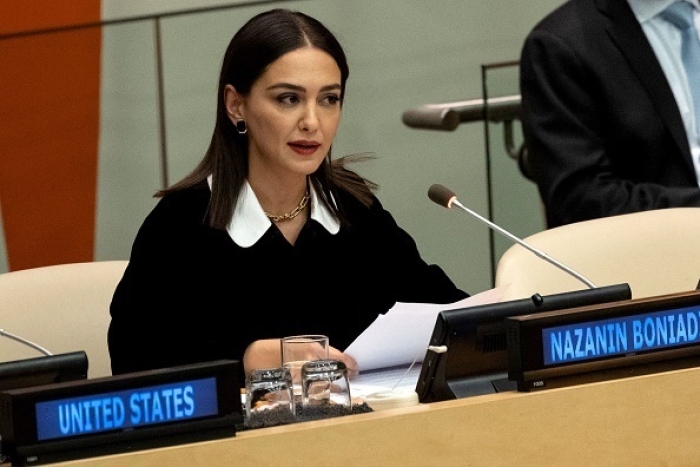The deal had provided Tehran with billions of dollars in sanctions relief in exchange for the country agreeing to roll back its nuclear program.
Ayatollah Accuses US of ‘Hybrid Warfare’; US Says It's ‘Not Pushing for the Downfall’ of the Regime

(CNSNews.com) – Iranian supreme leader Ayatollah Ali Khamenei on Wednesday accused the U.S., Israel, and other enemies of mounting “hybrid warfare” against the Islamic Republic, as the Biden administration threw its support behind a campaign to expel Iran from the U.N.’s top gender equality body.
In a speech to students, Khamenei said in reference to protests roiling Iran that “the events that took place these past few weeks were not merely street riots.”
“They were detailed plots,” he said. “The enemy initiated hybrid warfare. The enemy, namely the United States, the Zionist regime, some insidious and malicious European powers, and some groups, came to the scene with all of their capabilities.”
The regime’s news agency IRNA accused U.S. officials of riding “a wave of Iranian youths’ emotions” in a bid to “realize their hidden goals.”
The Islamic Revolutionary Guard Corps (IRGC) intelligence division earlier alleged that the CIA and Israel’s Mossad, closely cooperating with British and Saudi intelligence services and “reactionary proxies,” were playing a key role in provoking the unrest, “with the aim of committing a crime against the great nation of Iran and the country’s territorial integrity.”
The U.S. government has publicly expressed support for Iranians protesting against the regime, a movement sparked seven weeks ago by the death in custody of a young woman arrested for not complying with mandatory hijab rules.
But administration officials dispute that it supports “regime change.”
“We’re not pushing for the downfall of the Iranian government,” U.S. Ambassador to the U.N. Linda Thomas-Greenfield said in an interview with BBC Persian on Wednesday. “The people of Iran are speaking, and we are supporting their efforts to peacefully demonstrate against what their government is doing to them.”
“It is not up to the United States to determine any government, which government is in power in any particular country,” State Department spokesman Ned Price said on Tuesday when asked if the administration “supports a regime change or change in government in Iran.”
“That applies to Iran,” Price said. “This is a decision for the people of Iran.”
On Wednesday, the U.S. co-hosted an informal U.N. Security Council meeting to hear from Iranian women’s rights advocates, and announced that the U.S. will lead efforts to expel Iran from the U.N.’s Commission on the Status of Women (CSW).
Iran is serving a four-year term on “the world’s leading intergovernmental body exclusively dedicated to the promotion of gender equality and the empowerment of women,” after winning a secret ballot election in New York in April last year with the support of some liberal democracies.
Its election onto the CSW was slammed at the time by rights advocates. After the outbreak of protests and a harsh regime crackdown that has cost hundreds of lives a campaign to undo the move pick up steam, drawing support especially from high-profile women including former U.S. first ladies.
“The [CSW] cannot do its work when it is being undermined from within,” Thomas-Greenfield said during the Security Council meeting. “Iran’s membership is an ugly stain on the Commission’s credibility. In our view, it cannot stand.”
‘From theocracy to representative government’
During the meeting, Iranian-born actor and human rights advocate Nazanin Boniadi said the scale of rights abuses in Iran was a symptom of “a government considered illegitimate by its own people.”
She addressed what she said were two “myths” about the country – that hijab wearing is a “cultural” norm that shouldn’t be interfered with, and that the Islamic regime can be reformed.

“Where schoolgirls are defying a lifetime of indoctrination by rising up in classrooms, and people are taking to the streets in their tens of thousands to protest something despite the risk of death at the hands of the authorities, you can safely assume that’s not part of their culture,” she said.
“Another myth is that this regime is reformable,” Boniadi said.
“Elections in Iran are theater,” she said, adding that the rise to the presidency of Ebrahim Raisi, “a pillar of the oppressive state, implicated in crimes against humanity … is proof enough that a culture of impunity reigns supreme in Iran and that the theocracy is impervious to reform.”
Pointing to malign regime activities beyond its borders, Boniadi said that “the potential for the current protests to transform Iran from theocracy to representative government could be a geopolitical game-changer, and the single most important key to bringing about stability in the Middle East.”
The Iranian people want the international community “to stop turning a blind eye to their suffering in order to fulfil our own political objectives,” she said.
“For decades we’ve only responded to the symptoms of the Islamic Republic’s hostile activities, with a focus on countering Iran’s nuclear ambitions and regional aggression,” she said. “But in order to address the cause, we must commit ourselves to intelligently supporting the Iranian people’s democratic aspirations.”
Seated behind Boniadi as she spoke was Rob Malley, the administration’s point man in its diplomatic efforts to revive the Obama-era Iran nuclear deal, which President Trump exited in 2018.
Kayhan, a newspaper whose editor is appointed by and serves as an advisor to Khamenei, lashed out at what it called U.S. efforts to tarnish Iran’s image “through scattered incidents of riots in a few localities.”
“Its team of thugs, tricksters, terrorists, and traitors that include a handful of characterless women, have been ordered to indulge in arson, vandalism, murder, blasphemy, and obscene acts in public, accompanied by shouting of the weirdest of slogans against Islam and the Islamic Republic,” it said.
“Iran is the country of the virtuous and vigilant Muslim masses adhering to the Holy Qur’an,” Kayhan said. “So no-one in his or her wildest dreams can undermine the solid foundations of the Islamic Republic.”
Officials: Saudis tell US that Iran may attack the kingdom
WASHINGTON (AP) — Saudi Arabia has shared intelligence with American officials that suggests Iran could be preparing for an imminent attack on the kingdom, three U.S. officials said Tuesday.
The heightened concerns about a potential attack on Saudi Arabia come as the Biden administration is criticizing Tehran for its crackdown on widespread protests and condemning it for sending hundreds of drones — as well as technical support — to Russia for use in its war in Ukraine.
“We are concerned about the threat picture, and we remain in constant contact through military and intelligence channels with the Saudis,” the National Security Council said in a statement. “We will not hesitate to act in the defense of our interests and partners in the region.”
Saudi Arabia did not immediately respond to requests for comment. Nor did Iran's mission to the United Nations.
One of the officials who confirmed the intelligence sharing described it as a credible threat of an attack “soon or within 48 hours.” No U.S. embassy or consulate in the region has issued alerts or guidance to Americans in Saudi Arabia or elsewhere in the Middle East based on the intelligence. The officials were not authorized to comment publicly and spoke on condition of anonymity.
Asked about reports of the intelligence shared by the Saudis, Brig. Gen. Pat Ryder, the Pentagon press secretary, said U.S. military officials “are concerned about the threat situation in the region."
"We’re in regular contact with our Saudi partners, in terms of what information they may have to provide on that front,” Ryder said. “But what we’ve said before, and I’ll repeat it, is that we will reserve the right to protect and defend ourselves no matter where our forces are serving, whether in Iraq or elsewhere.”
State Department spokesperson Ned Price said America was “concerned about the threat picture,” without elaborating.
The Wall Street Journal first reported on the Saudis sharing the intelligence earlier on Tuesday. Iran has alleged without providing evidence that Saudi Arabia and other rivals are fomenting the dissent on its streets by ordinary Iranians.
Of particular ire is protest coverage by Iran International, a London-based, Farsi-language satellite news channel once majority-owned by a Saudi national.
The U.S. and Saudis blamed Iran in 2019 of being behind a major attack in eastern Saudi Arabia, which halved the oil-rich kingdom’s production and caused energy prices to spike. The Iranians denied they were behind the attack, but the same triangle-shaped, bomb-carrying drones used in that attack are now being deployed by Russian forces in their war on Ukraine.
The Saudis have also been hit repeatedly in recent years by drones, missiles and mortars launched by the Iran-backed Houthi rebels in Yemen. Saudi Arabia formed a coalition to battle the Houthis in 2015 and has been internationally criticized for its airstrikes in the war, which have killed scores of civilians.
In recent weeks, the Biden administration has imposed sanctions on Iranian officials for the brutal crackdown on demonstrators after the death of 22-year-old Mahsa Amini in September after her arrest by Iran's morality police. The administration has also hit Iran with sanctions for supplying drones to Russia for use in its war in Ukraine.
At least 288 people have been killed and 14,160 arrested during the protests, according to the group Human Rights Activists in Iran. Demonstrations have continued, even as the feared paramilitary Revolutionary Guard has warned young Iranians to stop.
Iran already launched a series of attacks targeting Kurdish separatist positions in northern Iraq amid the protests, killing at least 16 people, including an American citizen.
U.S. relations with Saudi Arabia have also been strained after the Riyadh-led alliance of oil producing nations, OPEC+, announced in October that it would cut production by 2 million barrels per day starting in November.
The White House has said it is reviewing its relationship with the Saudis over the move. The administration said the production cut is effectively helping another OPEC+ member, Russia, pad its coffers as it continues its war in Ukraine, now in its ninth month.
White House National Security Council spokesman John Kirby on Tuesday reiterated that the administration remains concerned that Iran may also provide Russia with surface-to-surface missiles.
“We haven't seen that concern bear out, but it's a concern we have,” Kirby said.
Even as the U.S. and others raise concerns about possible Iranian action, the administration has not ruled out the possibility of reviving the 2015 Iran nuclear deal, which was brokered by the Obama administration and scrapped in 2018 by the Trump administration.
The U.S. special envoy to Iran, Robert Malley, said on Monday that the administration was not currently focused on the deal, which has been stalled since August.
Still, Malley refused to declare the deal dead and said the administration “makes no apology” for “trying to do everything we can to prevent Iran from acquiring a nuclear weapon.”
The deal had provided Tehran with billions of dollars in sanctions relief in exchange for the country agreeing to roll back its nuclear program. It includes caps on enrichment and how much material Iran can stockpile and limits the operation of advanced centrifuges needed to enrich.

No comments:
Post a Comment